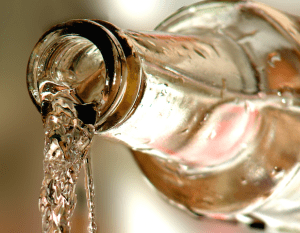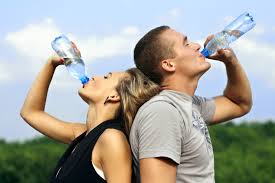 Nearly two thirds of the human body is water so before beginning any challenging exercise program it is paramount to understand the role that this most precious nutrient plays during exercise.
Nearly two thirds of the human body is water so before beginning any challenging exercise program it is paramount to understand the role that this most precious nutrient plays during exercise.
Water is critical when working out because your body perspires to cool itself down (sweat) which results in a loss of water.
The water lost through sweat needs to consistently be replaced with fresh clean water if you want to stay healthy, maintain hydration and avoid dehydration.
You can sweat out anywhere from 1 to 4% of your body weight every hour when performing an intense workout.
Although you do get some water benefit from other liquids such as milk, non-sweetened fruit juices and non-caffeinated drinks, it’s always best to drink fresh water from the purest source you can get it from. Be careful of so called sports drinks…never replace your water quota with these as they can contain excessive amounts of sugar and sugar is a prime cause of dehydration.
Water is not the only nutrient that you’ll lose while working out sodium and potassium (contained in sweat) can also be a concern after extreme physical exertion such as a marathon. Electrolytes, the minerals found in blood that help regulate the amount of water the body requires are also lost when we sweat. Most regular workouts will not requires the replacement of electrolytes, however, longer and intense periods do.
If you’re not into sports drinks to replace your electrolytes a great natural alternative is coconut water.
When you neglect your bodies cries for water it can lead to loss of coordination, muscle fatigue, confusion, exhaustion and cramps as well as a loss in regulating your body temperature which in turn results in poor athletic performance and eventually illness. Without proper hydration your body becomes nauseous and in severe cases the heart rate increases and you lose the ability to sweat and become delirious.
Muscles require water for strength and flexibility and your joints need water to stay lose and avoid stiffness while your brain needs water to function properly and communicate the body’s needs. Lean muscle contains more than 75% water so when you are not properly hydrated and your body is lacking water your muscles fatigue easily.
The amount of water you consume during your workout will vary depending on your weight and the type of workout you are performing. Generally it’s best to drink 8-16 ounces of water before you begin working out and continue to consume one full glass of water for every 20 minutes to half hour of work out time.
You can follow this guideline:
Drink at least 15-20 ounces of fresh water 1-2 hours before working out.
Sip another eight ounces 15 minutes before.
Sip 6 ounces of water approximately every 15 minutes (more if exercising in extreme heat or you are sweating excessively).
According to the American College of Sports Medicine, “you can access your level of hydration by examining urine output and color. Urine that is pale yellow is healthy while dark yellow indicates dehydration.
Another indicator to take note of is that if you are drinking enough water you will urinate more often.
If peak performance is what you’re after then you must give your body the proper nutrients and water is tops on the list. It is involved in every function of the body and is key to a successful workout, a successful recovery and a successful maintenance program.
In other words, drink water before, during and after your workout.
For more tools and resources from Carolyn Hansen to assist you in attaining your goals and achieving the success you desire in life, please visit:
